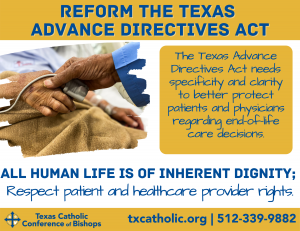Reform of Texas Advance Directives Act HB 3099 (Coleman) | SB 1944 (Lucio)
All human life, no matter how disabled or critically ill, is of inherent dignity and incomparable worth; all are entitled to adequate healthcare. A balanced approach to end-of-life care equally respects the rights of patients in the natural process of dying and the conscience of healthcare professionals providing their care.
The Texas Advance Directives Act dispute resolution process protects patients and physicians by providing a fair and reasonable process to resolve disagreements regarding end-of-life care decisions. The law is generally used appropriately and compassionately. Even with its advantages, however, some aspects of the TADA would benefit from more specificity and clarity. For this reason, the Texas Catholic Conference of Bishops and the Catholic Healthcare Association of Texas have sought reform of this act for more than a decade.
HB 3099 and SB 1944:
- Establish criteria for the ethics committee composition to ensure objectivity and prevent conflicts of interest;
- Provide protections to prevent discrimination against patients with disabilities;
- Allow the patient and/or patient representatives the option to attend and present at the ethics committee meeting;
- Require a patient liaison be appointed to assist patient or patient’s surrogate throughout the process;
- Extend notice to the patient/patient’s surrogate of the ethics committee meeting from 48 hours to seven calendar days;
- Extend the transfer time to an alternate facility from 10 days to 14 calendar days after the ethics committee meeting;
- Ensure a patient’s known wishes and values related to do-not-resuscitate (DNR) orders are respected, and that a patient’s surrogate may only revoke a valid DNR order if the surrogate authorized the DNR;
- Require hospitals to report data on the dispute resolution process;
- Clarify the circumstances under which interventions may be withheld or withdrawn; for example, if the interventions are outside the ordinary standard of care; and
- Allow provider/healthcare facility to run any necessary test or diagnostic to determine the patient’s medical condition.
We also support HB 2943 (Frank) which ensures that a patient's surrogate decision maker can only authorize the revocation of a do-not-resuscitate order that the surrogate initially authorized. The TCCB supports this bill to ensure that patient wishes for end-of-life care are respected.
SB 917 (Hughes) and HB 2609 (Parker) require health care providers to provide interventions they view to be inappropriate indefinitely at the demand of a surrogate. The TCCB opposes this bill as it imposes indefinite treatment on dying patients and ignores the reasonable medical and ethical judgment of professionals. Requiring physicians and hospitals to continue to provide non-beneficial interventions that they believe is unethical and inappropriate violates their freedom of conscience and harms patients.

